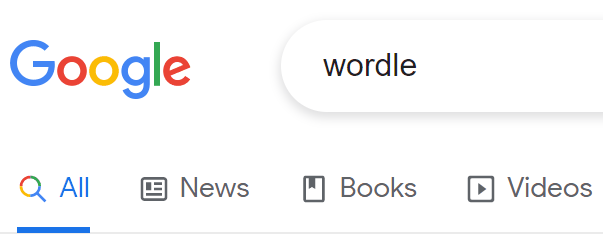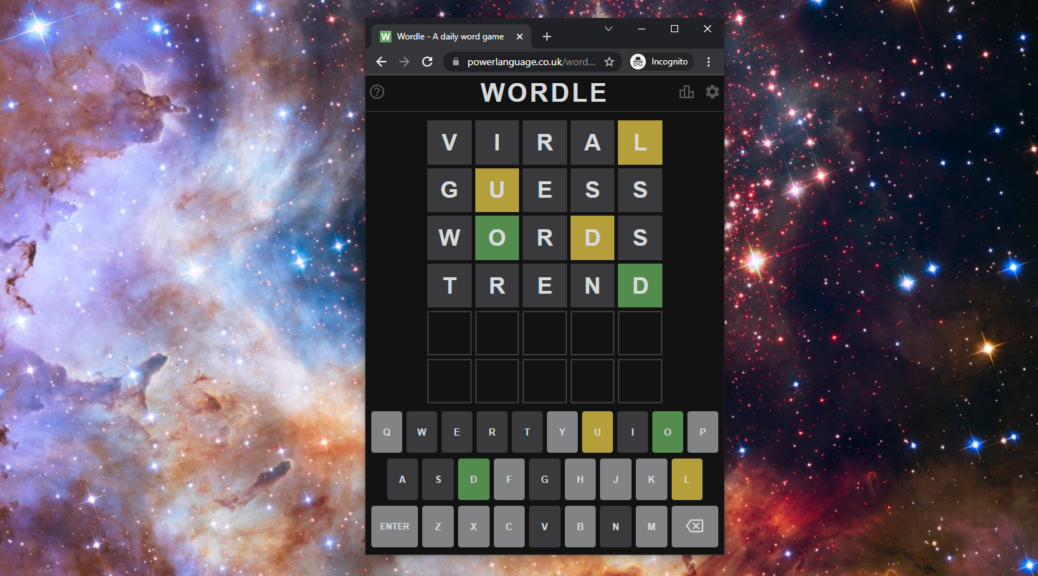It’s so refreshing that the latest viral phenomenon is Wordle, a homegrown internet minigame about guessing words.
No one can really predict the virality (virulence?) of a concept, but Wordle sure has the makings for uncontrolled community spread. It’s a well-structured minigame. It’s simple to understand and play, its only prerequisites being English literacy and an internet browser. It comes in digestible daily chunks for periodic and anticipated engagement. It has balanced difficulty: 4 letters could be difficult to localize but 6 letters may enable too much variation; and 6 guesses allows enough space but applies tangible stakes. Its instantly recognizable green emoji sharing format with the gray, yellow, and green boxes is the perfect infectious vector. And, of course, it’s free without ads.
Katie and I play too. We solve crosswords weekly, and this Wordle craze is like the spiritual successor to our NYT Spelling Bee phase last year. It’s often my last activity before bedtime. We got started three weeks ago: “Have you heard about Wordle?” Katie had said. “Everyone at the office is talking about it.” A floor at a major bank abuzz about the hot topic of an internet minigame? How marvelous!
This was days after the New York Times published a sweet article about the game’s darling origin story. Wordle is a personal project of Josh Wardle, a Brooklyn-based software engineer. The name “Wordle,” is a perfect wordplay on his name. He developed the game for his partner Palak Shah, an avid solver of crosswords and other word games including the NYT Spelling Bee. It’s impressive that his personal website has survived the tsunami of web traffic, but no wonder: Wardle is u/powerlanguage, the Reddit developer who made the 2015 and 2017 April Fool’s Day social experiments, r/thebutton and r/place (I learned this today; I don’t use reddit). He’d been hosting Wordle quietly for almost half a year before it spread uncontrollably in December. The now-iconic emoji block blurb was the latest crucial step in its evolution. For Wardle, Wordle’s unforeseen virality must be yet another fascinating exploration of internet community dynamics.
Now it feels like every news outlet is running stories about its contagiousness, including the New York Times again. On top of that, the next type of emerging article was the “strategies for Wordle,” most of which boil down to advice for best first word guesses based on letter frequency analyses, occasionally trained upon the word and answer dictionaries scraped directly from the source code. And now there are plenty of articles marveling at the meme-filled, clone-filled Wordle world. Even google.com pays homage!

Want to play the first 200 Wordles? Devang Thakkar coded a playable archive. Naturally, Wordle’s simplicity lends itself to easy spinoffs. Want to try some? Look to this Kotaku article, featuring Lewdle, Absurdle, Dordle, and others. Or maybe try Letterle, where you try to guess a letter in 26 guesses. Or how about the accidental sudden popularity of the homonymous but unrelated 2016 Apple Store game Wordle!? Want to watch internet denizens descend upon someone who tried monetizing a clone? (which, btw, I’m glad happened. My favorite mobile game Threes was cannibalized by the spinoff 2048; read what Three’s creators had to say, or my old post.) Ahh, what a Wordle moment.
I’m enjoying it, both the game itself and the frenzy of attention it’s getting. To really experience the moment, I’m refraining from looking at optimal first words; I just try to start any word that pop into my head, often inspired by just looking around, so long as it has two or three vowels and no repeating letters (recently I used words like dream, brain, opera, tripe). Then, I probe for unused letters until I find at least three letters. Finally, it’s just a matter of brainstorming “Wordle-ish” words, knowing that the dictionary was hand-curated by Wardle and Shah. It’s great fun, but I have to take my average score less seriously!
